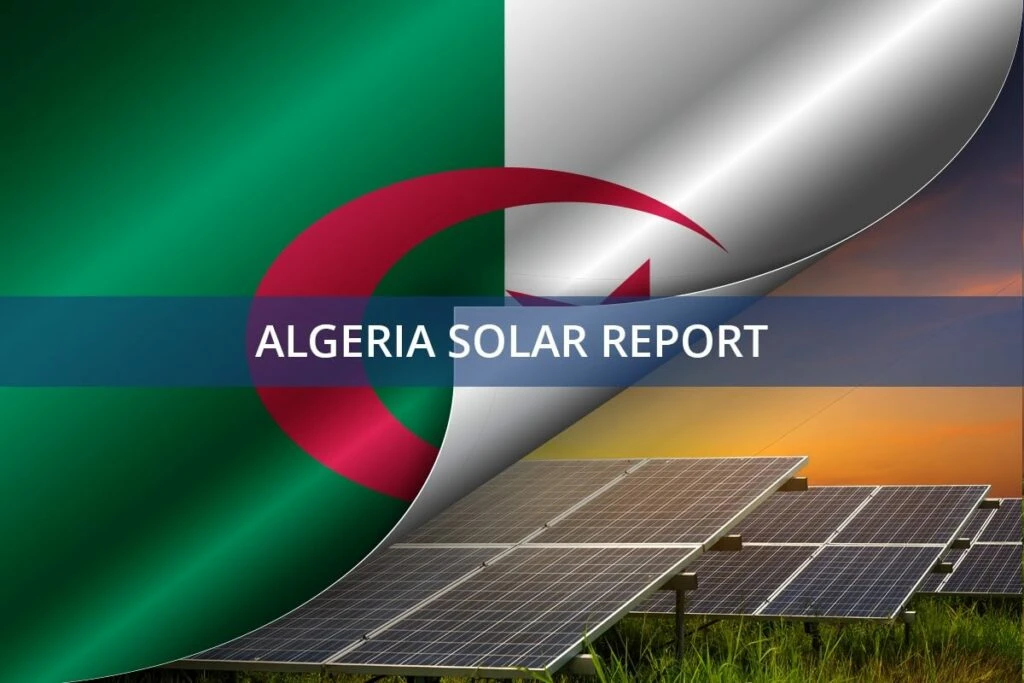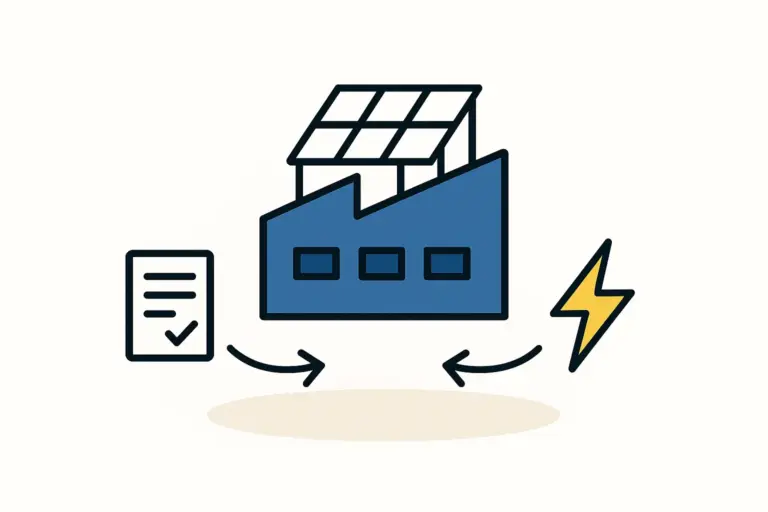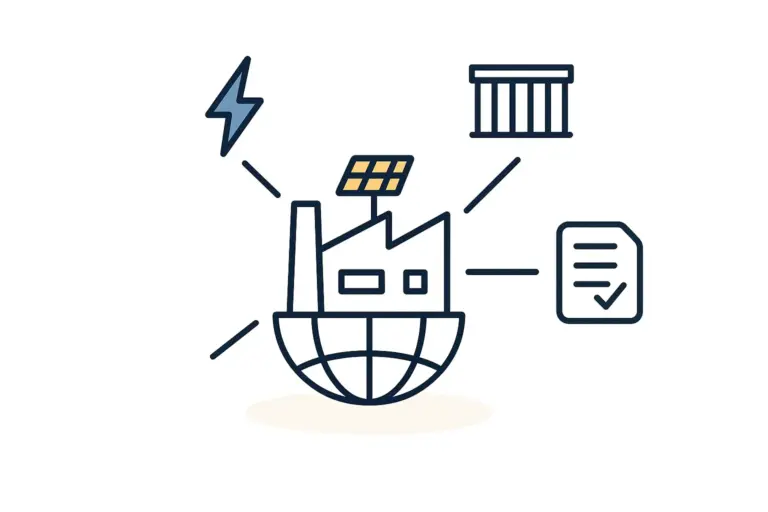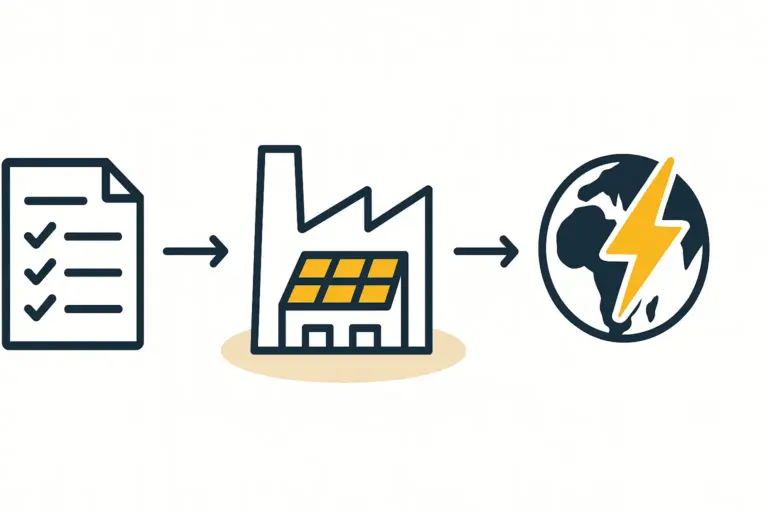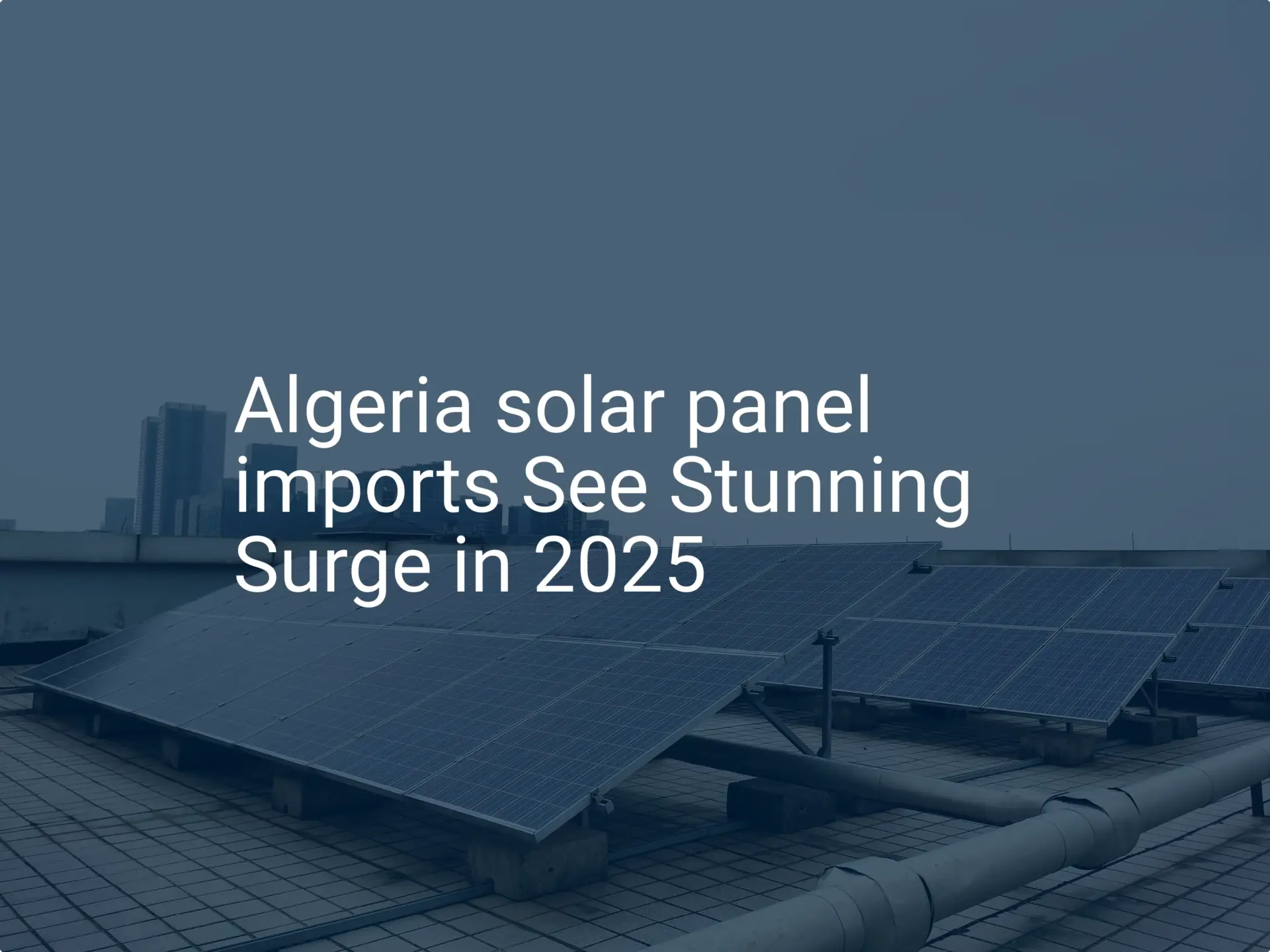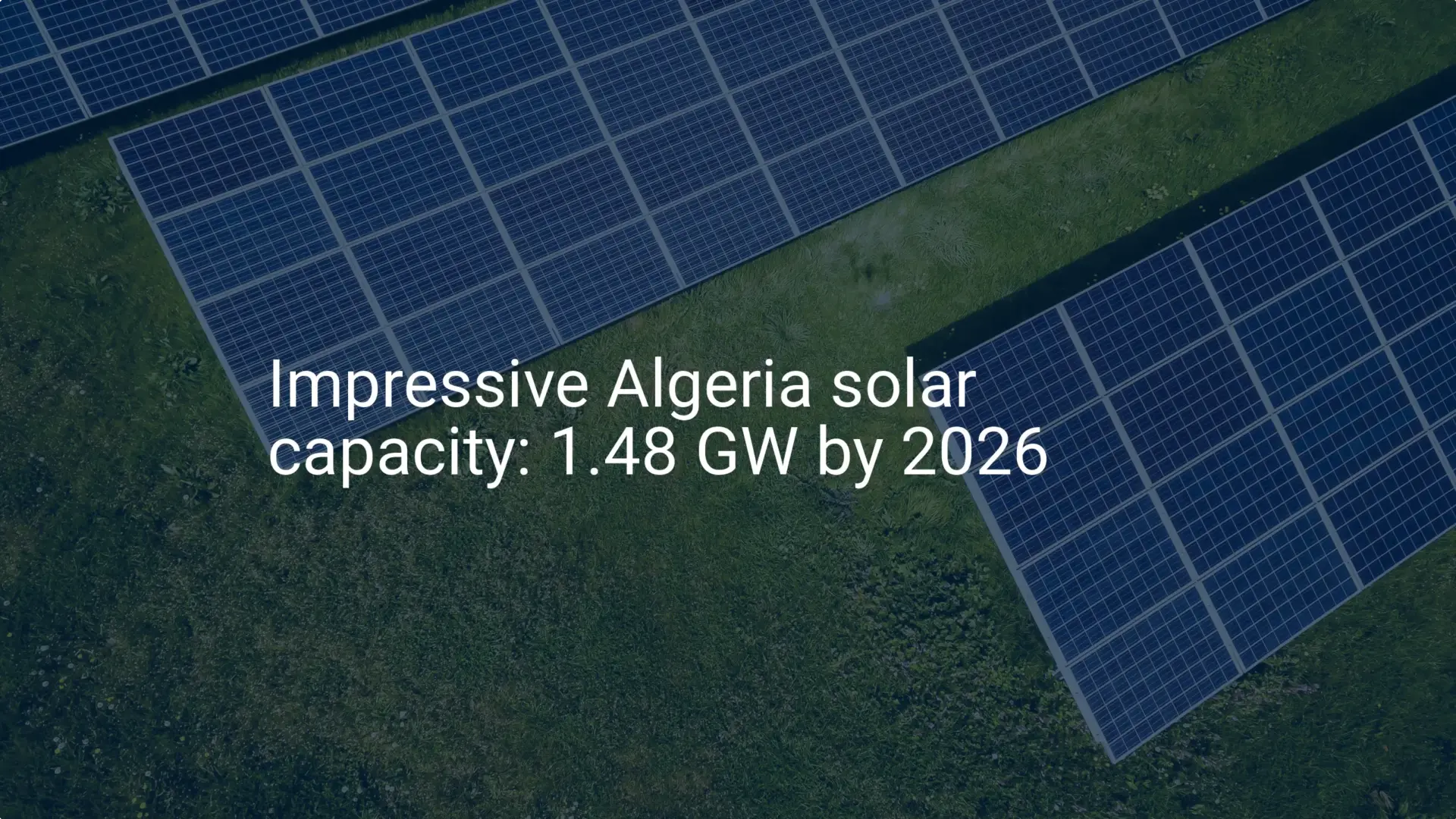Overview: Algeria’s Solar Energy Revolution
For ages, Algeria’s economy has been all about oil and gas. But things are shifting in a big way. The country is now making a smart move towards renewable energy, with its immense solar power potential at the forefront.
And honestly, it makes perfect sense. Algeria is practically swimming in sunshine—we’re talking some of the highest solar irradiance levels you’ll find anywhere on the planet (think 1,850-2,100 kWh/m²/year!). This natural advantage makes it a prime location for solar development, not just for its own energy needs but also with exciting prospects for exporting power down the line.
The Algerian government isn’t just making promises; they’ve laid out serious goals to shake up their energy mix, aiming for a massive 15,000 MW of renewable capacity by 2035. Solar is pegged to be the star performer. This commitment is a major green light for investment and is laying the groundwork for a thriving local solar manufacturing scene.
So, if you’re an entrepreneur with a vision, an investor looking for the next big thing, or an established manufacturer exploring new horizons in Algeria’s solar panel production space, you’ve landed in the right spot. We’ve poured critical market intelligence into this guide for you. Here at PVknowhow.com, we’re passionate about helping folks like you set up solar module production lines all over the world, and we’re delighted to share this deep dive. Our aim is simple: to give you the insights needed to get a handle on the opportunities and thoughtfully plan your move into this incredibly promising market. We’re excited to see what you can build!
Table of Contents
The Policy and Regulatory Landscape for Solar Manufacturing
Algeria’s enthusiasm for solar isn’t just talk; a solid policy and regulatory structure is taking shape to support it, one that’s constantly being tweaked to bring in investment and help local industry grow. Let’s dig into what this means for you as a potential manufacturer of solar panels in Algeria.
National Renewable Energy Program & Targets
At the core of Algeria’s green ambitions lies the National Renewable Energy Program. A key headline is the goal to get 27% of electricity from renewable sources by 2035. And solar PV? It’s expected to do much of the heavy lifting. You’ll hear talk about specific targets like the “Solar 1,000 MW” initiative, which is being followed by plans for another 2,000 MW. Looking further out, a broader program is targeting 3.2 GW in the near future—all vital steps on the road to the much larger goal of 15 GW by 2035. Also, keep an ear to the ground for a new energy transition plan, due to launch around March 2025, which should further solidify these commitments.
Incentives and Support Mechanisms
To get local solar panel production humming and draw in investors like you, the Algerian government is putting various kinds of support on the table. These helpful initiatives include:
- Attractive preferential tariffs for electricity produced from renewable sources.
- Tax incentives, or even exemptions, for those investing in the renewable energy sector.
- Grants and subsidized loans to help get manufacturing plants up and running.
- A growing push for local content requirements in public tenders—this is a big one, as it helps create a built-in market for panels made right in Algeria.
Tender Processes and Regulatory Bodies
The government, primarily through the Ministry of Energy and Mines and its associated bodies like the Renewable Energy Development Center (CDER), steers solar project development. Tenders, such as for the “Solar 1,000 MW” scheme, often spell out specific requirements for Independent Power Producers (IPPs) and Engineering, Procurement, and Construction (EPC) contractors. Understanding these processes, especially the increasing drive for local content and partnerships, is essential for manufacturers. Key organizations you’ll likely interact with include Sonelgaz (the state-owned utility) and its subsidiary SKTM (Shariket Kahraba wa Taket Moutadjadida).
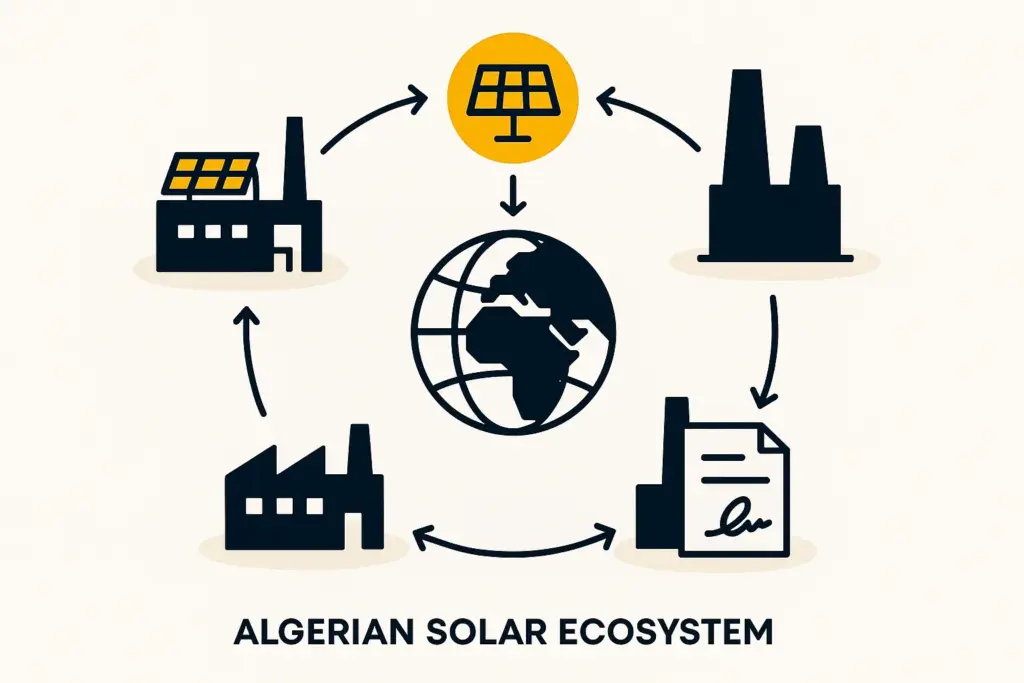
Market Deep Dive: Algeria’s Solar Panel Production Potential
So, what’s the deal with Algeria’s solar market? Picture this: vast, mostly untapped potential with a palpable buzz of growing momentum. It’s an exciting space to watch, and even more exciting to jump into.
Current Capacity and Growth Projections
As of late 2023, Algeria had around 437-460 MW of installed solar PV capacity. While that might sound like a modest beginning, the growth path ahead looks incredibly steep. The renewable energy market, with solar as a key driver, is poised for significant expansion. Some analysts are forecasting a Compound Annual Growth Rate (CAGR) of over 15% for the renewable industry between 2025 and 2033. This upward curve is being fueled by the ambitious government targets we mentioned earlier and the falling costs of solar technology worldwide.
Solar Irradiance and Geographical Advantages
Alright, let’s talk about sunshine! Algeria is blessed with one of the highest solar irradiation rates on the planet, especially in the vast expanse of the Sahara Desert. This incredible natural gift makes solar power generation highly efficient and economically attractive. And with so much land available, developing large-scale solar farms is highly feasible, which, in turn, creates sustained demand for solar panels. It’s a powerful combination, wouldn’t you say?
Demand Drivers
What’s fueling the demand for solar energy and, by extension, solar panels in Algeria? Several key factors are at play:
- Energy Diversification: This is a big one. Algeria wants to reduce its reliance on fossil fuels for its own energy needs. A smart side-effect? It frees up valuable gas for export.
- Meeting Growing Electricity Demand: The country simply needs more power to support its industrial growth and an expanding population. Solar offers a clean way to meet this growing appetite.
- Export Potential: Exciting long-term visions are floating around, like the Desertec Industrial Initiative, which sees Algeria becoming a major exporter of green energy to Europe. Just imagine the possibilities there!
- Rural Electrification: For communities that are off the main grid or in remote areas, solar power provides a practical and effective solution to get the lights on.
End-User Market Profile
Right now, the biggest chunk of demand comes from utility-scale projects, often spurred by government tenders. However, we’re seeing budding but growing potential in the commercial and industrial (C&I) rooftop solar space. Residential solar is also starting to make an appearance, and we expect these areas to gain more traction as policies and financing options become more user-friendly.
The Investment Climate: Opportunities and Considerations
Considering putting your money into Algeria’s solar panel manufacturing scene? That’s a significant step, and it calls for a solid understanding of both the wider economic environment and the specific opportunities ripe for the picking.
Economic Outlook and FDI
Algeria is working to roll out the welcome mat for foreign direct investment (FDI). We’re seeing recent reforms aimed at simplifying business registration, offering better protection for investor rights, and providing incentives in key strategic sectors—and yes, renewable energy is one of them. While there are always challenges to navigate in any emerging market, the government’s clear dedication to diversifying its economy is opening up new avenues for foreign and local investors.
Opportunities in Solar Panel Manufacturing
The primary opportunity, and it’s a significant one, lies in establishing local solar panel production and assembly plants. This fits hand-in-glove with government policies that champion local content and industrial growth. So, what could this mean for you?
- Greenfield Projects: You could build new, cutting-edge manufacturing facilities from the ground up.
- Joint Ventures: Partnering with existing Algerian companies can be a savvy way to tap into local know-how and market connections.
- Supplying Turnkey Production Lines: If your strength lies in providing the equipment, technology, and expertise, there’s a clear need for that as local entrepreneurs look to get started or scale up.
It’s also encouraging to see major international names, like China’s Longi, showing interest in setting up manufacturing in Algeria. That’s a strong, positive signal about growing investor confidence.
Financing Landscape
Alright, so where does the funding for these solar projects and manufacturing ventures typically come from? You have several avenues to explore:
- Local Banks: They are increasingly being encouraged (and sometimes directed) to back renewable energy initiatives.
- Government Funds: Be on the lookout for specific national funds earmarked for the energy transition.
- International Development Finance Institutions (DFIs): Big players like the African Development Bank (AfDB) and others often express keen interest in North African renewable projects.
- Private Equity and Foreign Investment: As the market continues to mature, we anticipate more private capital flowing in.
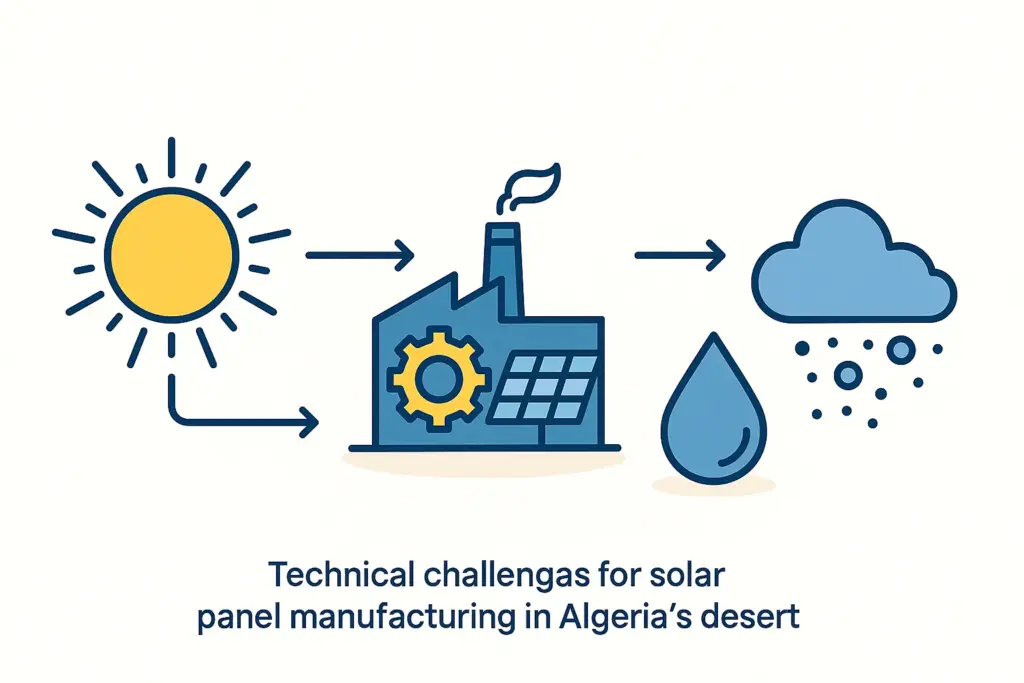
Navigating the Competitive Arena
The solar panel production scene in Algeria is a lively one. Local companies are making their mark, and international interest is unmistakably growing. So, let’s take a moment to get a sense of who’s who in this evolving arena.
Existing Local Manufacturers
Several Algerian companies have already established themselves in solar panel assembly. Some of the key names you’re likely to hear include:
- Zergoun Green Energy: They’re reported to have an annual production capacity somewhere around 200 MW.
- Lagua Solaire (part of Condor Electronics): Also a significant name, with an assembly capacity in the neighborhood of 200 MW.
- Milltech (System Met Ghardaia): Contributing with approximately 100 MW capacity.
These local firms often have a distinct edge, thanks to their understanding of the home market and the government’s backing for domestic industries. All told, the existing local assembly capacity is estimated to be around 470-500 MW per year, and that number is expected to rise.
International Players and Suppliers
International solar companies, particularly those from China, are playing a significant part as technology suppliers and potential investors. Jinko Solar, for instance, has been a major panel supplier for various projects in Algeria. The presence of international equipment suppliers is also vital for setting up and modernizing local manufacturing lines. This is precisely where companies like us at PVknowhow.com fit in, specializing in providing turnkey solar production lines and essential technical know-how to businesses worldwide.
Supply Chain Analysis
Developing a robust local supply chain for essential raw materials—like glass, aluminum frames, EVA, and backsheets—is a key area of growth. Currently, many specialized materials and the solar cells themselves are imported, placing an emphasis on efficient import logistics.
As a manufacturer, you’ll need to become adept at navigating this process. At the same time, it’s wise to keep your eyes peeled for opportunities to help localize parts of this supply chain—doing so is important for meeting local content rules and making your operations more cost-efficient in the long run.
Overcoming Challenges in Algeria’s Solar Manufacturing Sector
While the opportunities in Algeria’s solar sector are exciting, it’s always smart to go in with a clear view of the landscape—bumps and all. If you’re looking to manufacture here, you should be ready to tackle a few challenges.
Regulatory Hurdles
Even with ongoing improvements, bureaucratic processes can, let’s be honest, sometimes feel sluggish. For investor confidence to stay strong, it’s crucial that policies remain stable and that tender processes are transparent. It’s also worth noting that, historically, some renewable energy projects have run into delays, which highlights why doing your homework thoroughly (due diligence!) is so important before taking the plunge.
Technical and Environmental Factors
- Harsh Desert Conditions: Solar panels in Algeria, especially those out in the Sahara, face a tough environment. They need to handle high temperatures, sandstorms, and significant temperature differences between day and night. This calls for specific panel designs and robust strategies for keeping them clean and well-maintained.
- Water Consumption: While PV solar itself hardly uses any water to operate (unlike Concentrated Solar Power—CSP, which is a different beast), water scarcity is a concern in the region. This is particularly true if any local manufacturing processes further up the chain (like polysilicon production, though this is less common for module assembly plants) happen to be water-intensive.
- Manufacturing Footprint: Considering your environmental impact is key. Addressing potential pollution from manufacturing and managing your production’s carbon footprint are increasingly important global considerations that apply here too.
Economic and Financial Barriers
- High Initial Investment: Let’s be frank: setting up a solar panel manufacturing facility requires a hefty chunk of capital to get off the ground.
- Energy Pricing: Historically, prices for conventional energy in Algeria have been subsidized. This can sometimes make the economic case for solar less clear-cut if there aren’t strong feed-in tariffs or other robust support mechanisms in place to level the playing field.
- Currency Fluctuations: As with any international venture, managing the risks that come with the Algerian Dinar is something you’ll need to factor into your planning.
Infrastructure and Workforce
- Grid Stability: While it’s improving, the electricity grid in some areas might still need upgrades to smoothly absorb large amounts of intermittent solar power. This can indirectly impact demand and how ‘bankable’ projects are seen.
- Skilled Labor: There’s a need to expand the local pool of technicians, engineers, and skilled workers who know their way around solar technology and advanced manufacturing. Investing in training and sharing knowledge will be crucial for long-term success.
Local Content and Supply Chain
Meeting increasingly strict local content requirements can sometimes feel like putting together a complex puzzle, especially if domestic supply chains for all the necessary components aren’t fully developed. This is where building strong local partnerships can make all the difference.
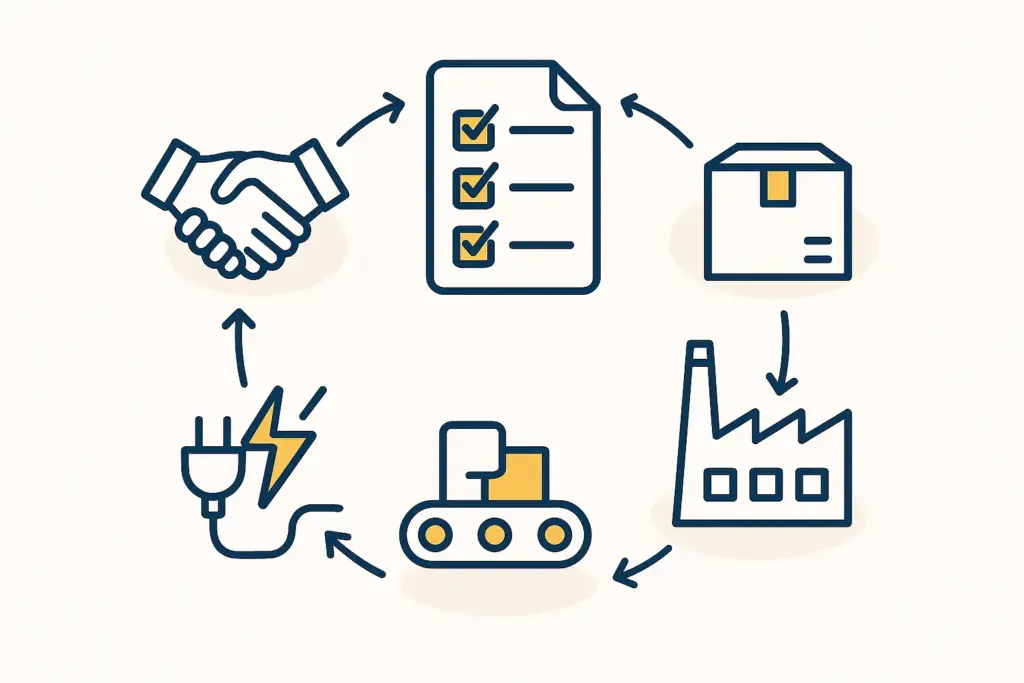
Technological Imperatives for Success
If you want to make your mark and thrive in the competitive world of solar panel manufacturing, keeping up with the latest technological advancements isn’t just a ‘nice-to-have’—it’s essential.
Suitable Manufacturing Technologies
Algeria presents opportunities for various scales of solar panel manufacturing, from manual assembly lines to highly automated facilities.
The technology you choose will largely depend on your investment level, target capacity, and specific market demands. Currently, much of the local production focuses on assembling modules using cells imported from other regions.
Trends in Solar Cell Technology
The global market is constantly evolving, and at the moment, we’re seeing a shift towards higher efficiency solar cell technologies like TOPCon (Tunnel Oxide Passivated Contact) and HJT (Heterojunction Technology). If you’re seriously considering entering the Algerian market, it’s a smart move to take a good look at these advanced technologies. They can help ensure your long-term competitiveness and make sure your panels meet performance expectations, especially in the challenging climate conditions we talked about.
Automation in Manufacturing
Bringing more automation into your solar panel manufacturing can boost production efficiency, improve the consistency of quality control, and help you manage labor costs more effectively. Investing in modern, automated, or even semi-automated production lines can give you a competitive advantage.
Ancillary Industries
The growth of solar manufacturing rarely happens in isolation; it can often spark development in all sorts of related industries too. For instance, think about:
- Solar-Powered Green Hydrogen: Algeria has massive potential for producing green hydrogen using its plentiful solar resources. This, in turn, creates even more demand for solar panels.
- Battery Storage: As more and more solar power comes online, the need for energy storage solutions will naturally skyrocket. This could open up interesting avenues for local battery assembly or even manufacturing down the track.
- Mounting Systems and Components: There’s also good potential for local production of things like frames, mounting structures, and other ‘balance-of-system’ components.
Strategic Roadmap for Market Entry & Growth
A solid, well-thought-out strategy is your best ally when it comes to successfully entering and thriving in Algeria’s solar panel manufacturing market. Let’s sketch out some of the key things you’ll want to consider.
Key Success Factors
What does it take to make an impact? From what we’re seeing, these factors are crucial:
- Strong Local Partnerships: Working hand-in-hand with Algerian entities can be incredibly valuable for navigating the local business culture, meeting local content regulations, and accessing insider market knowledge.
- Technology Transfer and Training: Investing in developing local technical skills isn’t just good for Algeria; it’s vital for the long-term health and success of your own operations.
- Quality and Durability: Producing top-quality panels specifically designed to withstand Algeria’s unique and sometimes harsh climate will make you stand out from the crowd.
- Understanding of Regulatory Framework: You’ll need a deep and current understanding of how tender processes work, what incentives are up for grabs, and all the details of local content requirements.
- Cost Competitiveness: Running a tight ship with efficient operations and smart supply chain management will be key to offering prices that the market finds attractive.
Recommended Market Entry Strategies
So, how can you get your foot in the door? Here are a few proven approaches:
- Turnkey Factory Solutions: You might consider partnering with experienced providers (like us here at PVknowhow.com!). We can help you set up a complete production line, taking care of everything from the machinery and process engineering right through to essential technology transfer.
- Joint Ventures: Forming strategic alliances with established local businesses can be a very shrewd move.
- Direct Investment: If your company has strong financial backing and you’ve done your homework on the market, setting up a wholly-owned subsidiary is another viable route.
Building Relationships
This next point is a big one: take the time to cultivate strong relationships. We’re talking about government agencies like the Ministry of Energy and Sonelgaz, relevant industry associations, and, of course, potential local partners. These connections can be invaluable.
Long-Term Planning
Try to think beyond just getting the factory doors open. Focus on how you can scale up your operations down the line, adapt to new and evolving technologies, and perhaps even explore opportunities for exporting to neighboring African markets or Europe in the future. The sky can be the limit if you plan strategically!
Ready to turn these insights into action? Visit our free e-course to start planning, or explore our services for dedicated support. For a comprehensive roadmap, our Premium Business Plan E-Course provides personalized guidance to launch your venture. Let’s build your success in Algeria’s solar market together.
Conclusion: Seizing the Sunshine – Algeria’s Solar Manufacturing Horizon
Algeria’s path towards a sun-powered future offers a compelling prospect for entrepreneurs and investors ready to dive in and make their mark in the solar panel manufacturing world. The country’s amazing solar resources, coupled with solid government support and a clear, growing appetite for clean energy, are coming together to create favorable conditions for local production.
Sure, there are challenges to navigate—getting through regulatory hoops, adapting to infrastructure requirements, and helping to build up the skilled workforce. But let’s be clear: these hurdles are by no means insurmountable, especially when approached with smart strategic planning, strong partnerships, and an unwavering focus on quality and technological progress.
By doing your homework (and yes, thorough due diligence is key!), getting a true feel for the local context, and drawing on global expertise where it makes sense, your business can play a vital role in Algeria’s exciting energy transition. And you know, this is about more than just business; it’s about contributing to economic diversification, creating much-needed jobs, and nurturing sustainable development for the long haul.
The future for solar manufacturing in Algeria looks bright. We believe that now is the perfect time to start exploring this rapidly growing market. Algeria’s solar horizon is full of potential. What are your thoughts on the opportunities for manufacturers, or do you have questions about navigating this market? Share your insights in the comments below—we’re keen to hear from you!
Frequently Asked Questions (FAQs)
Q1: What are Algeria’s main solar energy targets?
A: They’re certainly aiming high! Algeria’s goal is to have 15,000 MW of renewable energy capacity up and running by 2035, and solar PV is a huge part of that plan. The government is also targeting 27% of its electricity from renewables by that same year. You’ll also hear about specific programs like the “Solar 1,000 MW” initiative, followed by plans for another 2 GW, and a broader 3.2 GW scheme already in motion.
Q2: What kind of government support is available for solar panel manufacturers in Algeria?
A: There’s definitely some good news on that front! The Algerian government provides a variety of incentives to support the sector. These can include attractive feed-in tariffs for renewable electricity, tax breaks or exemptions for renewable energy investments, potential grants or subsidized loans for facilities, and a strong push for local content in government tenders, creating a market for Algerian-made panels.
Q3: Who are the existing local solar panel manufacturers in Algeria?
A: Yes, there are several established local players. Some of the main ones you’ll come across are Zergoun Green Energy, Lagua Solaire (part of the Condor Electronics group), and Milltech (System Met Ghardaia). Between them, their current estimated annual assembly capacity is roughly in the 470-500 MW range.
Q4: What are the biggest challenges for solar panel manufacturing in Algeria?
A: As with any big opportunity, there are hurdles. Manufacturers might face challenges such as navigating regulations, designing panels for harsh desert conditions (heat, dust), securing significant upfront investment, ensuring grid compatibility for large solar inputs, developing a skilled local workforce, and establishing a robust domestic supply chain for components.
Q5: Is foreign investment encouraged in Algeria’s solar sector?
A: Oh, absolutely! Algeria is very keen to attract foreign direct investment, especially in strategic areas like renewable energy—it’s high on their agenda. They’ve been introducing reforms to make the investment environment more appealing. We’re seeing international companies show interest, and forming partnerships with local Algerian businesses is often encouraged and can be a very smart move.
Q6: What is the solar irradiation potential in Algeria?
A: It’s truly exceptional! Algeria boasts some of the highest levels of solar irradiation anywhere on the globe—generally, we’re talking about 1,850 to 2,100 kilowatt-hours per square meter per year (kWh/m²/year). The Sahara Desert, in particular, is a powerhouse for sunshine, making it an incredibly well-suited place for solar power generation.
Q7: Are there opportunities for specific solar technologies in Algeria?
A: Yes, for sure. While much current local production focuses on assembling standard modules, there’s a noticeable and growing interest in higher-efficiency cell technologies, such as TOPCon and HJT. These advanced cells can maximize energy output, which is especially valuable in Algeria’s demanding climate. Plus, incorporating more automation into manufacturing is key for efficiency and quality.
References
All references
- https://www.pvknowhow.com/solar-report/algeria/
- https://www.pvknowhow.com/news/algeria-solar-power-program-launches-3-2-gw/
- https://www.trade.gov/country-commercial-guides/algeria-renewable-energy
- https://www.trade.gov/energy-resource-guide-algeria-renewable-energy
- https://energynews.pro/en/algeria-and-longi-discuss-industrial-partnership-for-solar-panel-production/
- https://www.solarpowereurope.org/insights/thematic-reports/algeria-solar-investment-opportunities
- https://www.eunews.it/en/2024/10/02/energy-algerian-commissioner-for-renewables-solar-panel-production-on-the-rise/
- https://eco-pledgeafrica.com/eco-innovation/algerias-massive-solar-power-project-harnessing-the-saharas-potential/
- https://www.pv-magazine.com/2025/04/28/longi-expresses-interest-in-solar-manufacturing-in-algeria/
- https://www.solarpaces.org/worldwide-csp/csp-potential-solar-thermal-energy-by-country/algeria/
- https://www.africanews.com/2022/10/03/algerias-renewable-energy-potential-solar-power-is-the-way-to-go/
- https://www.ief.org/news/algeria-powers-ahead-with-huge-renewable-energy-plans
- https://www.agenzianova.com/en/news/in-algeria-entra-in-funzione-il-nuovo-piano-sulla-transizione-energetica/
- https://www.ejosdr.com/article/challenges-and-prospects-of-concentrated-solar-power-deployment-in-algeria-15137
- https://cleantech.marketing/report/algeria-solar-pv-market-report/
- https://www.pv-magazine.com/2024/11/07/a-turning-point-for-algerian-solar/
- https://www.sciencedirect.com/science/article/pii/S2468227623002272
- https://www.mordorintelligence.com/industry-reports/algeria-renewable-energy-market
- https://www.mfat.govt.nz/en/trade/mfat-market-reports/algeria-a-market-worth-watching-may-2025
- https://www.marketreportanalytics.com/reports/algeria-renewable-energy-industry-99959
- http://www.ascalgeria.com/
- http://www.aures-solaire.com/
- https://zergoungreenenergy.com/
- https://www.pvknowhow.com/news/solar-panel-algeria-chinese-firm-plant/
- https://www.solarfeeds.com/c/algeria/solar-panel
- https://www.power-technology.com/data-insights/top-five-solar-pv-plants-in-operation-in-algeria/
- https://www.enfsolar.com/directory/installer/Algeria
- https://www.statista.com/statistics/1370923/solar-energy-capacity-in-algeria/

